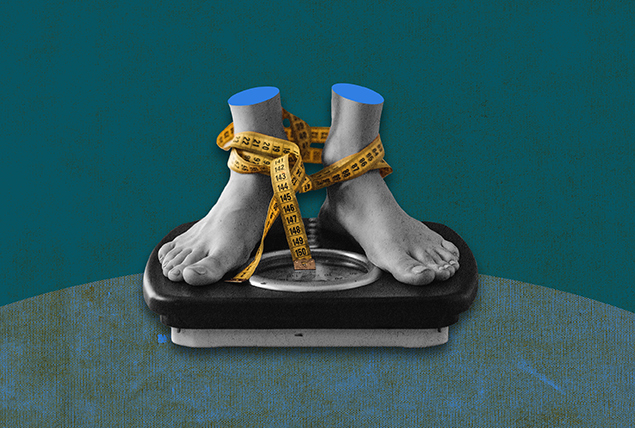Bulimia Nervosa: What Could Go Wrong?

Bulimia nervosa is an eating disorder characterized by binge episodes and purging behaviors, which could include abusing laxatives and diuretics, self-induced vomiting, overexercising and restrictive eating. This disorder poses several risks to heart health, pregnancy and mental health, and can have a negative impact on sexual health. Bouts of overeating and purging can often be followed by feelings of guilt and remorse.
Statistics published by the American Addiction Centers indicate that about 6 million people—three females for every one male—will experience bulimia at some point during their lifetime.
Common symptoms of eating disorders in general are reported to be low sexual desire alongside feelings of anger, anxiety, depression and disillusionment. Bulimia is linked to disordered relationships, because sufferers may withdraw from others as their obsession with food becomes all they care about.
People who binge often feel insecure about controlling themselves, which can lead to brief moments of sexual impulsivity, but mostly, there's a lack of enthusiasm for frequent or consistent sexual behavior.
Bulimia nervosa can be treated, but it's important to get diagnosed first and undergo treatment as soon as possible to reduce the risk of further health complications.
Heart health and bulimia nervosa
Eating disorders pose a major risk to heart health. According to the National Eating Disorder Association (NEDA), one of the biggest risks of an eating disorder is the body breaking down tissue for fuel because it doesn't have enough calories. The tissues typically broken down first are muscles and organs. The heart is technically a muscle, and the effects can result in pulse and blood pressure dropping as the heart has less fuel and fewer cells to help it pump.
Bulimia nervosa, specifically, has been associated with several heart conditions. A 2019 study stated the compensatory behaviors associated with bulimia nervosa—abusing laxatives or diuretics, self-induced vomiting, overexercising and restrictive eating—can all affect cardiovascular stability.
"Vomiting and use of laxatives can result in electrolyte imbalance and an increased short-term risk of arrhythmias," the study stated. "Damage to cardiac myocytes may also occur and lead to congestive heart failure, ventricular arrhythmia or sudden cardiac death."
The psychological stress of bulimia nervosa also poses a risk to heart health.
"Bulimia is associated with psychosocial stress and anxiety, which are additional risk factors for cardiovascular disease and death," the study stated. "Bulimia nervosa, therefore, has the potential to have a long-term association with the development of cardiovascular disease."
The study added that bulimia nervosa may be associated with the long-term risk of any cardiovascular disease, such as ischemic cardiac events and conduction disorders, as well as with death among women. It also suggested that women with a history of bulimia nervosa should be screened regularly for ischemic cardiovascular disease and may benefit from prevention of and treatment for cardiovascular risk factors.
Pregnancy and bulimia nervosa
Becoming pregnant while having bulimia nervosa can be dangerous.
"Professionals recommend that disordered thoughts and behaviors are addressed before attempting to get pregnant," NEDA states. "While gaining weight is required for a healthy pregnancy, for those with eating disorders, having to gain weight can be very frightening."
A study published in May 2022 stated that bulimia nervosa may be associated with inadequate pregnancy weight gain, nutritional deficiencies and maternal stress.
In general, the risks associated with pregnancy for someone with an eating disorder include: poor nutrition, dehydration, cardiac irregularities, gestational diabetes, severe depression during pregnancy, premature birth, labor complications, difficulties nursing and postpartum depression, according to NEDA.
The 2022 study looked at data from more than 9 million pregnancies, and of those, 260 women had bulimia nervosa. The study concluded that infants born to women with bulimia nervosa were more likely to be small for gestational age compared to infants born to women without bulimia nervosa.
For any pregnant person, NEDA recommends: "Eating healthy, well-balanced meals and maintaining a healthy weight for several months before conceiving and throughout pregnancy is important to protecting the health of yourself and your baby."
While there are many potential risks associated with pregnancy for people with bulimia nervosa, pregnancy does impact people differently, and for many, becoming pregnant reduces bulimic behaviors.
A 2004 study examined changes in bingeing, purging and substance use behaviors during pregnancy for people with bulimia nervosa. The study found the need to purge lessened for nearly 65 percent of the participants, worsened for 7.5 percent, and remained the same for 28 percent. Similarly, the need to binge-eat lessened during pregnancy by 65 percent. Body image, however, worsened for 44 percent of participants, improved for 21 percent, and stayed the same for 35 percent.
This study demonstrated that the experience of being pregnant with bulimia can vary tremendously from person to person. It also concluded that pregnancy may represent a time of high readiness for change and, ultimately, may be an effective time to offer treatment to women with bulimia nervosa.
Impacting mental health
Bulimia nervosa can have a major impact on your mental health.
"One hundred percent of our clients who are diagnosed with bulimia nervosa are also diagnosed with a co-occurring condition," said Melissa Spann, L.M.H.C., the chief clinical officer of Monte Nido & Affiliates in Miami. "That could be anxiety or that could be a mood disorder, whether it's depression, bipolar or other conditions."
"A co-occurring mental health diagnosis can begin around the same time as an eating disorder, can precede it, or can emerge after the eating disorder has already begun," NEDA explains on its website.
The association clarifies that anxiety, depression and obsessive-compulsive disorder (OCD) often accompany an eating disorder and can even be the result of behaviors associated with bulimia nervosa, such as bingeing, purging and restricting.
"The single biggest co-occurring mental health condition would be PTSD and trauma," Spann said. "Bulimia nervosa also has some significant co-occurring substance abuse-related pieces. When we look at certain temperamental traits associated with bulimia nervosa, particularly around risky behaviors, we see similarly within the substance-related community."
According to NEDA, about 50 percent of people with an eating disorder use drugs or alcohol—a figure five times higher than in the general population. In addition, 35 percent of people with alcohol or drug dependency have had an eating disorder, which is 11 times the rate in the general population.
"Eating disorders and substance use share a number of common risk factors, including brain chemistry, family history, low self-esteem, depression, anxiety and social pressures. Other shared characteristics include compulsive behavior, social isolation and risk for suicide," according to NEDA.
How bulimia nervosa impacts sexual health
"When it comes to overall sexual health, this is a huge part of eating disorders because we're talking about a mental health disease of a sense of self," Spann explained. "So it's about struggling with your perception of yourself, your body, with the skin you're in, and more often than not, if you are not comfortable within yourself, you're not going to want to be comfortable with someone else."
People with an eating disorder, including bulimia nervosa, may feel uncomfortable being naked with another person. They may experience self-criticism, be hyperaware of what their body looks like or feel overly concerned with their sexual performance, all of which can make sex much less enjoyable. These feelings can also lead to difficulty with arousal, getting or maintaining an erection and reaching orgasm.
A study published in 2010 in the International Journal of Eating Disorders sampled 242 women and found nearly 70 percent of the participants with an eating disorder experienced a decrease in libido. Sexual anxiety was also prevalent among those with an eating disorder.
There is limited research on the specific impacts of bulimia nervosa or other eating disorders on men's sexual health. However, it is likely that bulimia nervosa impacts erectile function, as a large component of bulimia is anxiety, which can contribute to psychological erectile dysfunction (ED).
Related conditions and complications
"There are many complications and related conditions that can arise from bulimia nervosa, especially if it goes untreated," Spann said.
For starters, dental issues are a common co-occurring issue for people who engage in self-induced vomiting, she said.
Mental health challenges, as discussed, are among the most prevalent complications associated with bulimia nervosa. A 2001 study found women with bulimia nervosa were over three times more likely to have alcohol, anxiety or depressive disorders than those without an eating disorder.
"Women with bulimia nervosa or binge eating disorder reported markedly poorer functioning and much higher levels of disability, health problems, insomnia, psychosocial stress and suicidal thoughts than did women without bulimia nervosa," the study reported. "Patients with binge eating disorder and bulimia nervosa reported more limb or joint pain, headaches, gastrointestinal problems, menstrual problems, shortness of breath and chest pain than patients without psychiatric disorders."
Diabetes was also significantly more common among patients with bulimia nervous than those without.
If you suspect you or a loved one has bulimia nervosa or any eating disorder, seek support as soon as possible. The National Eating Disorder Association Helpline can be reached via phone, text or online chat 24/7 to provide support, resources and treatment options. Call or text (800) 931-2237.


















